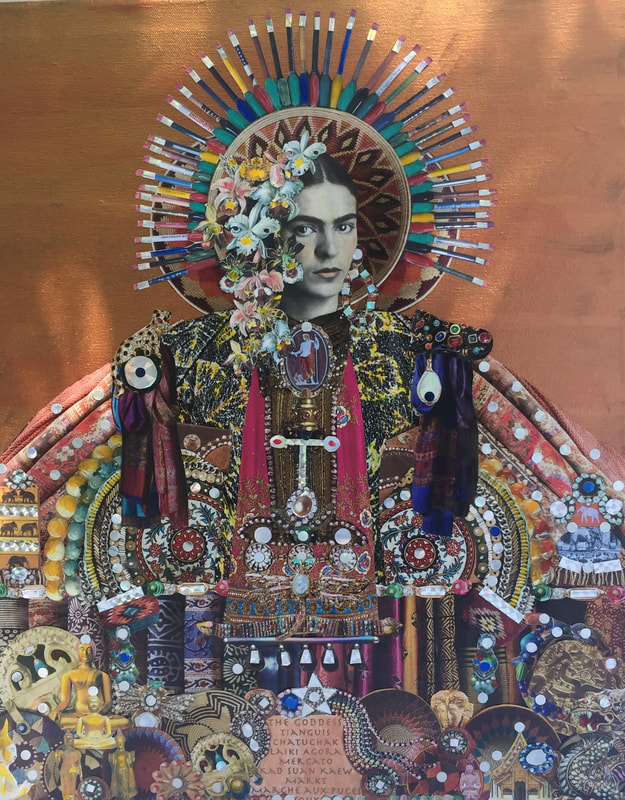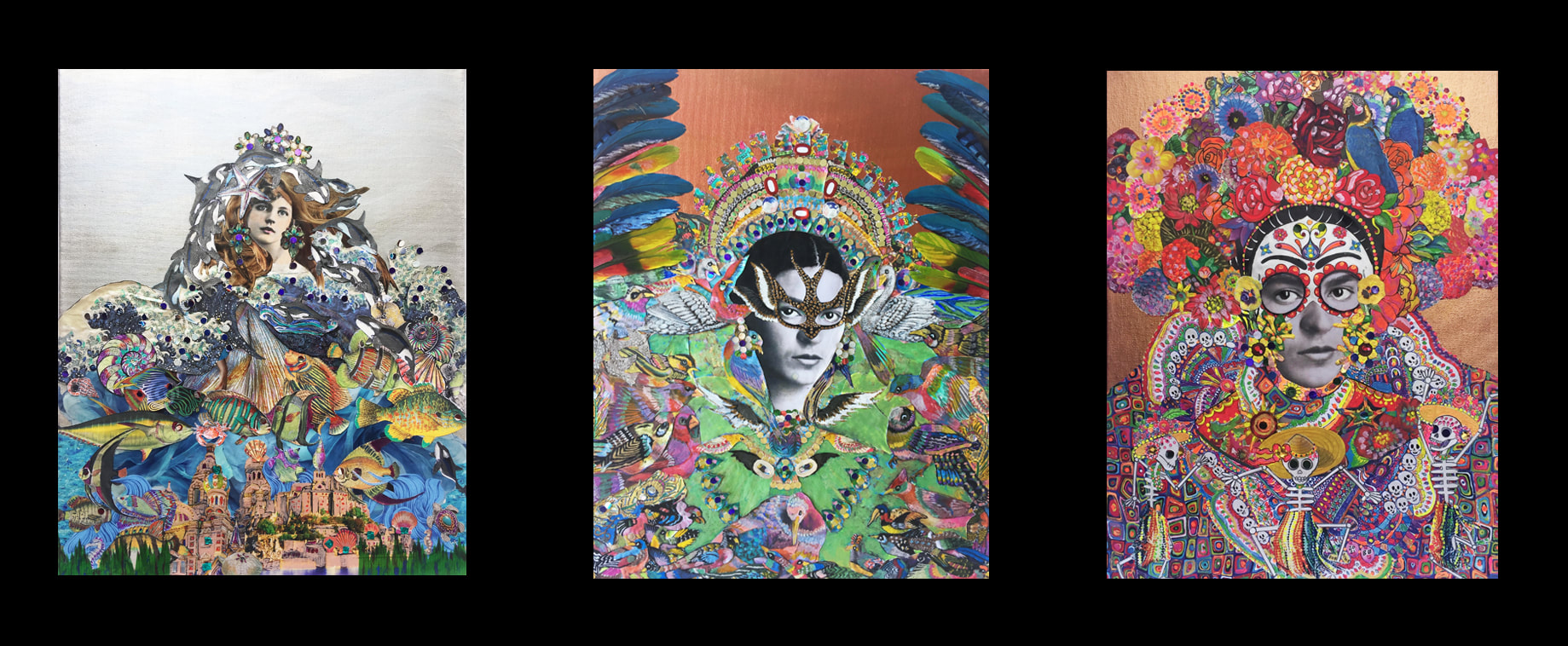|
SOLD OUT
SAALM Mini-Workshop on Collage Date: Saturday, March 9, 2024 Time: 12 Noon to 4:00 PM 130 King William Street (Semmes Studio) $75 SAALM members $85 non-members Obsession: A Visual Tribute To One’s Own What is it that you never grow tired of looking at, examining, considering? In this workshop, using the medium of collage, you’ll use paper and/or other types of ephemera to capture and pay tribute to that obsession that fascinates you, and has always gotten your full attention. Taught by Becky Benavides: writer, artist—and now—teacher. “Creativity can’t be taught, but it can be learned.” Rick Rubin
What you’re going to learn in this workshop is how simple techniques and processes with grade-school basics like glue, paper, and paint can be made to do the equivalent of advanced yoga (plus maybe a few karate moves too). There will be practical tips and advice, and an environment of support as you experiment and explore. But you won’t be encouraged to mimic the visual style of your teacher. In fact, the exact opposite will happen. Why? Because your obsession is yours and yours alone. And your art should reflect that. The end result should be intensely personal, meaningful, one-of-a-kind. In other words, you will do you! Now for one last thought about collage: Like any other creative medium, it can enjoy the playgrounds of abstraction, portraits, landscapes, surrealism, comedy, drama—and more. So approach it with an open mind and open heart. And it will open your eyes. Wide. |
“The older I get, the more I find that I am a collage of my curiosities, my influences, my inspirations I have gathered. And, as I get older, I find that they continue to grow, expand my horizon, and lead me to deeper, richer questions.” ~Elliott Blackwell~ |
|
List of essential supplies to bring
Plus suggestions and recommendations Essential: Bring a selection of acrylic paints in colors that you want to work with. (Do not bring oil paints, oil pastels, watercolors, etc. In other words, avoid bringing anything that requires a long drying time or lots of liquid.) Essential: Something that serves as a palette for mixing paints. Essential: Medium / varnish for acrylic paint (gloss, semi-gloss, or matte finish. It’s your choice). Once your collage is complete, you will gently brush this over the whole surface to protect / preserve it. Essential: Artist paintbrushes in a range of sizes / shapes that you feel comfortable working with. Essential: A stable container for water to clean your paintbrushes. Essential: At least one stretched, primed canvas (or gessoboard), no larger than 16” x 20” (but even smaller is better, because one of the goals is to get as close as possible to at least one finished collage by the end of the workshop. So the less “real estate” you need to cover, the more likely that will be to accomplish.) Essential: Roll of paper towels for your own clean-up. Essential: Soap for clean-up (your paintbrushes and your hands). Essential: Scissors that can make clean, precise cuts in almost any kind of paper, fabric, etc. (Joyce Chen scissors are good ones, but any kind of scissors that you are comfortable using will be fine). Essential: Large tube of Elmer’s Glue Stick (if you can find it, get the kind that goes on purple, but becomes clear as it dries. It helps you see where you’re putting the glue). Essential: 1 bottle of clear Elmer’s Glue (especially if you are using materials that are not paper (like textiles, seeds, etc.). Essential: A large selection (many, many more than you think you will need!) of the images you want to consider using in your collage. |
Recommended: If you can, bring one or more clean plastic Starbuck’s coffee
stir sticks (because of how the ends are designed, these can be very handy tools when it comes to applying glue in small targeted areas, and for gently burnishing down paper, eliminating air bubbles, etc.). Recommended: Some of those large 1 or 2-gallon food storage bags (clear, plastic, with the “zip” closer) that you can keep your collage materials in. Think of these as “file folders.” They will allow you to see what you have, and will also help keep the materials sorted, dry, and clean. Suggested: If you have one of those small portable tabletop easels that don’t take up much table space, bring it. Suggested: Tweezers for handling very small pieces of paper, etc. Suggested: Paper punches and specialty scissors that create shapes / patterns. Recommended: Get educated on copyright / trademark issues regarding using images / designs owned by others. You don’t want to create legal problems for yourself. Plus, there’s that ethical issue and bad karma of using another creator’s work—without permission—which you wouldn’t want done to your own work! Essential preparation prior to the workshop: Paint the whole surface of your canvas or gessoboard with background color(s) of your choice. You need it to be completely dry prior to begin creating your collage. Have all the cutting, trimming, scissor-work done on anything you might want to use in the collage prior to the workshop. Doing this means you will be able to start working on your collage immediately at the workshop. (Somehow, the cutting and trimming always takes longer than it seems like it should, so plan ahead!) Suggested: Potential sources (depending on your obsession, of course!) for collage ephemera are…product packaging in the supermarket / drugstore; thrift stores, junk shops, used bookstores, garage and estate sales; magazines, newspapers, catalogs, junk mail, etc.; photos; gift-wrapping paper and tissue, ribbons, gift bags, etc.; paper party goods (plates, napkins); greeting cards; seeds, shells; rhinestones, sequins, spangles, beads, bits of lace, ribbon, etc.; dried, pressed flowers, leaves, bark; bird feathers. (But a heads-up: feathers can be very frustrating to work with.) And finally, consider using your own drawings, doodles, etc.—especially when you can’t find exactly what you’re looking for elsewhere. |

